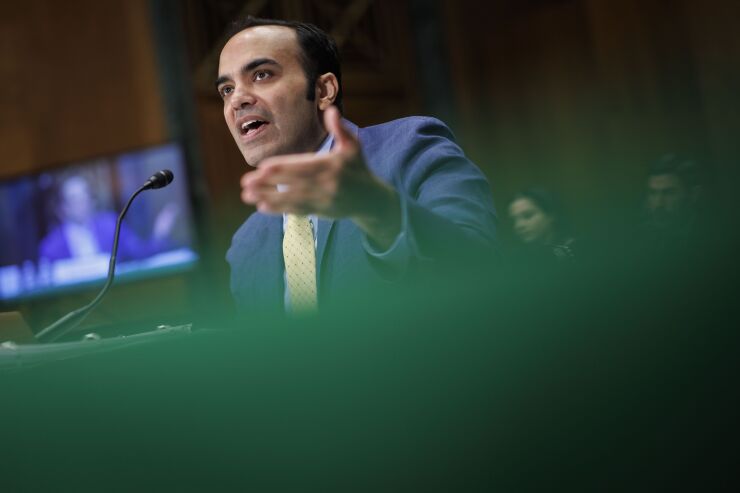
WASHINGTON — Consumer Financial Protection Bureau director Rohit Chopra said in a speech Friday that the absence of clear rules around digital payments and data protection could lead to a payments system in the United States where commerce and payments are consolidated, with profound implications for data privacy and financial stability.
Speaking at an event at the Brookings Institution Friday, Chopra said the payments infrastructure that has emerged in China could pose an ominous model for private actors in the United States to follow if left unchecked.
"I fear that the U.S. is lurching toward a consolidated market structure like the one that has emerged in China that blurs the lines between payments and commerce and creates the incentives for excessive surveillance and even financial censorship," Chopra said. "As we seek to configure a payments architecture that can provide safe and secure electronic cash, we should make sure that the deployment of private sector technologies and services are aligned with our values for fair competition, consumer protection and our national security."
Chopra said the bureau is poised to take some preliminary actions to address those concerns. The agency is poised to issue supplemental orders to "certain large technology firms" seeking additional information on "specific business practices and plans, especially with respect to the use of personal data and any issuance of private currency." The bureau is also exploring the issuance of new guidance to bank and nonbank firms "regarding the applicability of the Electronic Fund Transfer Act with respect to private digital dollars and other virtual currencies," Chopra said.
The CFPB has been circling the data and payments activities of tech giants like Apple and Google for some time. The agency issued a request for information and public comment on big tech firms data practices
Chopra went on to say the bureau is looking at "a number of authorities" under its control to conduct examinations of nonbank payments platforms, and said the Financial Stability Oversight Council should use its authority under Title VIII of Dodd-Frank to designate payments platforms as an activity that either contains systemic risk or "as likely to become a systemically important payment clearing or settlement activity."
That recommendation is in line with one outlined in a
"It would be highly inappropriate, as you know, to comment on the deliberations that we have on that, but it is explicitly referenced in the 2021 report," Chopra said. Such a designation, absent directives from Congress, "at a minimum … would provide some additional tools on liquidity on standards to make sure that some of the risks about coins being runnable, about creating destabilization — that could be addressed."
Chopra added that the bureau on its own will publish "later this month" a rule outlining consumers' rights with respect to financial data under Section 1033 of the Dodd-Frank Act, a
"I think the concept of purpose limitation — if I'm offering you and asking for your data to originate an auto loan to you, is it reasonable that I'm also going to sell that information to [someone] because I know that you're in the market for a lawn mower?" Chopra said. "We will be proposing some rules that will accelerate open banking. And I think part of that is going to be some use restrictions on the data that its consumers are permissioning to financial firms."






